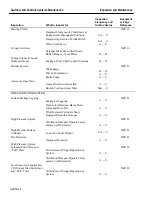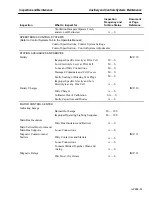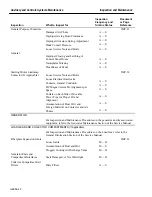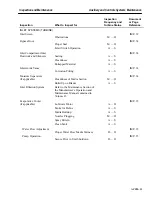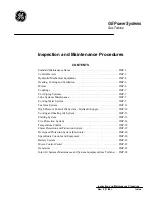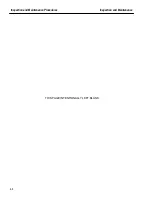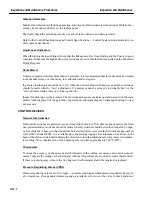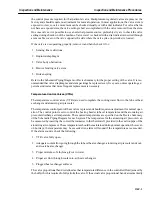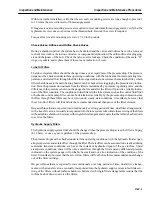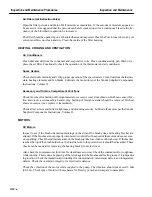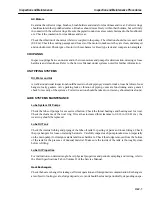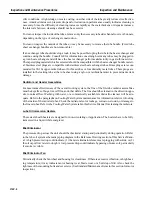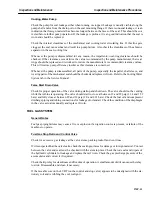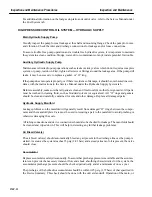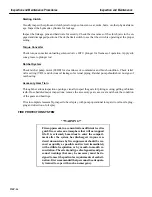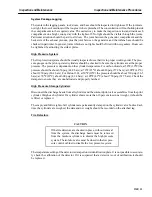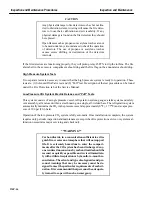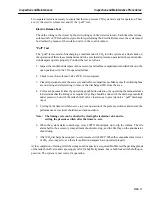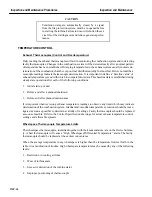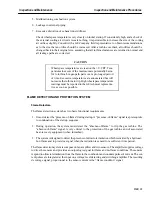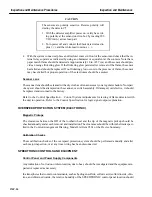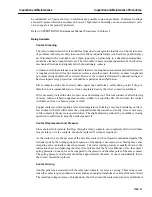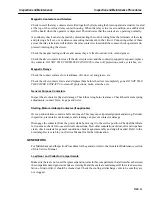
Inspection and Maintenance Procedures
Inspection and Maintenance
IMP–8
cific conditions. A light sludge, or scale coating, on either side of the tube greatly reduces its effective-
ness. A marked increase in pressure drop and/or reduction in performance usually indicates cleaning is
necessary. Since the difficulty of cleaning increases rapidly as the scale thickens or deposits increase,
the intervals between cleanings should not be excessive.
To clean or inspect the inside of the tubes, remove only the necessary tube side channel covers or bonnets,
depending on the type of exchanger construction.
To clean or inspect the outside of the tubes, it may be necessary to remove the tube bundle. (Fixed tube
sheet exchanger bundles are non-removable.)
If an exchanger tube should develop a leak, it may be possible to plug the tube in the heat exchanger and
continue using the bundle. Consult GE for information concerning how many tubes may be plugged in
a given heat exchanger and still have the heat exchanger perform satisfactorily in gas turbine service.
The tapered plug material which is selected should be compatible with the heat exchanger bundle materi-
al. Stainless steel plugs are compatible with stainless steel heat exchanger tubes. Brass plugs are recom-
mended for 90-10 copper-nickel tubes or for brass tubes or for admirality metal tubes. These plugs are
installed in the leaking tube at the tube sheet using a nylon or rawhide hammer to prevent inadvertent
damage.
Radiator and Header Assemblies
For maximum effectiveness of the overall cooling system, the fins of the fin-tube radiator assemblies
must be kept free of bugs, lint, oil film, and other debris. The fins should be cleaned in the direction oppo-
site to normal flow. Washing with water, or a commercially available radiator fin cleanser will be ade-
quate. Refer to the paragraphs on Cooling Water System maintenance for information relative to fouling
of the inside of the radiator tubes. Check the radiator also for leakage, corrosion, erosion, or damage to
the fins or tubes. Refer to the Cooling Water System tab in this Service Manual for cleaning the radiators.
Lube Oil Immersion Heaters
These steel sheath heaters are designed for non-circulating oil application. The heaters have to be fully
immersed in a liquid while energized.
Mist Eliminator
The pressure drop across the unit should be checked at startup and periodically during operation. Refer
to the lube oil system schematic piping diagram in the Reference Drawing section of this Service Manu-
al. A high pressure drop could indicate, (1) the mist eliminator elements are plugging with solids, or (2)
the oil vapor flow rate is too high. A low pressure drop could indicate bypassing of some sort, particularly
if smoke is visible.
Mist Eliminator Fan
Periodically check the fan wheel and housing for cleanliness. If there is excessive vibration, or high bear-
ing temperature, it may indicate motor bearing wear, blade wear, or a build up of dirt. Also check the
tightness of the mounting bolts and set screws. (See Standard Maintenance Items in this section for motor
inspection.)
Summary of Contents for MS6001B
Page 2: ...Gas Turbine Inspection and Maintenance GEK 107048 I 2 THIS PAGE INTENTIONALLY LEFT BLANK ...
Page 4: ...Inspection and Maintenance Note THIS PAGE INTENTIONALLY LEFT BLANK ...
Page 13: ...INSERT TAB INTRODUCTION ...
Page 14: ......
Page 25: ...INSERT TAB STANDARD PRACTICES ...
Page 26: ......
Page 87: ...INSERT TAB AUXILIARY CONTROLS SYSTEMS MAINTENANCE ...
Page 88: ......
Page 133: ...INSERT TAB SCHEDULED TURBINE MAINTENACE ...
Page 134: ......
Page 157: ...INSERT TAB COMBUSTION INSPECTION ...
Page 158: ......
Page 239: ...INSERT TAB HOT GAS PATH INSPECTION ...
Page 240: ......
Page 313: ...INSERT TAB MAJOR INSPECTION ...
Page 314: ......
Page 316: ...Inspection and Maintenance GEK 107048 Major Inspection 2 THIS PAGE INTENTIONALLY LEFT BLANK ...
Page 363: ...INSERT TAB MAINTENANCE FORMS ...
Page 364: ......

